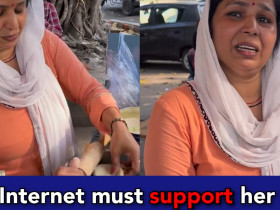No products in the cart.
Farmer builds 780 toilets in 35 days to make his village free from open defecation
Almost 70% of the population lives in rural India and the public health conditions regarding clean drinking water, sufficient treatment and disposal of human excreta and sewage have been the main concern. As per the latest report, 732 million people which is 56% of the Indian population still don’t have basic sanitation. Under the central government’s campaign, Swachh Bharat Abhiyan, 52 million household toilets have been constructed between October 2014 and November 2017.
But what seems to be continuing is the practice of the old-age tradition of ‘open defecation’. As part of the Swachh Bharat Abhiyan, the 45-year-old Manilal Rana decided to work with his team. They built 780 toilets in his village in a span of just 35 days. Interestingly, Manilal is the only swachhagrahi (ambassador of cleanliness) from Rajasthan who was honoured by Prime Minister Narendra Modi at the concluding ceremony of #ChaloChamparan initiative held in Bihar on April 10, 2018.

Manilal Rana comes from Savaniya of Rajasthan’s Banswara district. He witnessed a life-changing moment when he came during one of his trips to cities like Ahmedabad and Mumbai, where he learnt that most people have got toilets in their households itself. However, it was a different scenario in Manilal’s village called Savaniya, where people still practised the old tradition of open defecation. He was aware that the need for toilets in every home of his village. He sketched out a plan to execute it.
In a conversation with NDTV, Manilal said, “As soon as a thought was born, I decided to work on it. We had to figure out two things before undertaking any activity – the reason behind lack of toilets and the number of toilets required. For the same, I joined hands with youth and led behavioural change. When we started the campaign, there were some 280 toilets in the village and we had to build over 700 toilets, says Manilal Rana, who already had a toilet at his place.”
Before he could turn his idea into action, he came across some hard challenges such as the uncompromising attitude of his villagers towards safe hygiene practices. When he tried to convince people they would say, “Our forefathers have been defecating in the open, why should we do things any differently? The villagers would also oppose the concept of having a toilet inside the premises of their house stating, ‘We cannot have a kitchen and toilet together.”
Manilal started explaining them through real-life examples. He stressed the fact the problems caused due to open defecation are diarrhoea, housefly breeding, etc. After listening to this, the fellow villagers understood what Manilal was actually telling. It also made it quite easier for Manilal to start the proceedings.
The toilets in the village are identified as izzat ghar (House of dignity). Manilal also feels that the toilets protect the dignity of the women of his village, and as a result, the people need not defecate in the open area anymore. Manilal said, “Slowly and gradually, the whole exercise was turned into a ceremony. Every morning, the Sarpanch and Nigrani Samiti members (supervisors), accompanied by a priest would visit households to mark the laying out of twin-pit toilet construction.”








